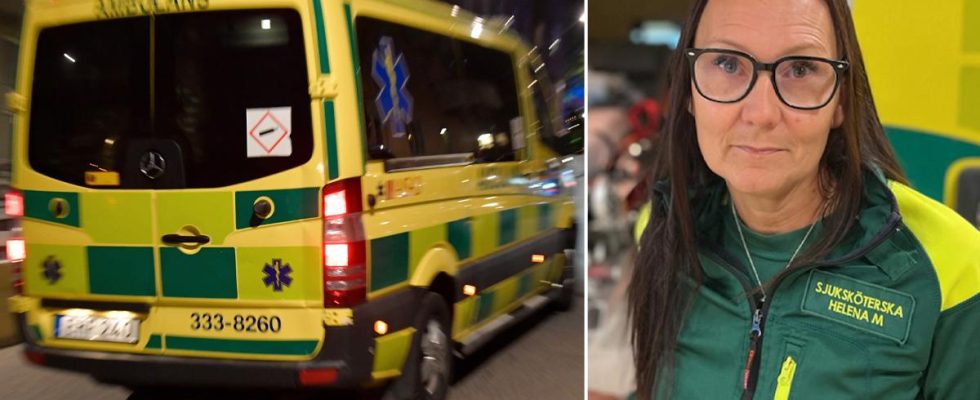Save the article
Eleven hours of rest is the new requirement.
It has caused more than half of the ambulance nurses in Sollefteå to resign – and the union demands that the state intervene before it gets worse.
– It will end in disaster, says Helena Modin, one of all who resigned in Sollefteå.
Since 1 October, new rules for 24-hour rest for employees in health care and emergency services in municipalities and regions apply.
Employees must have eleven hours of daily rest between their work shifts – something that in the spring led to major protests among paramedics, personal assistants and firefighters.
According to the Ambulance Association, the ambulance service throughout the country has been affected by mass redundancies since it became clear that the 24-hour shifts will be banned.
– Several hundred have resigned. The model that the regions have chosen to introduce also requires that you would have to recruit 30, 40 percent more staff. No one has done that, because there is neither money nor personnel for it, says Henrik Johansson, union secretary at the Ambulance Association.
“More will resign”
Among the worst affected regions are Gävleborg, Kalmar, Norrbotten and Västernorrland, according to the Ambulance Association.
And in Sollefteå the situation is extreme. There, 19 ambulance nurses, more than half, have resigned. One of them is Helena Modin.
– We have had to park two of our four ambulances, she says.
She resigned when it became clear that the 24-hour shifts, which allowed her to work 24 hours a day, seven days a month on call. Now she has to work eleven-hour long day or night shifts, not infrequently with overtime and twice as many shifts.
– It is not sustainable with the family, the children do not get the time with me that they need, she says.
Other colleagues commute from other locations and for them it is not worth commuting 10, 15 miles one way for more, shorter sessions.
According to her, two out of four ambulances in Sollefteå have been forced to stop due to the lack of staff, ambulances from other places are forced to cover.
If an emergency alarm goes off, it can be a matter of life and death.
– I feel a great concern for patient safety. A cardiac arrest can occur where the ambulance does not arrive in time because it has to be sent from another location, she says.
When Helena Modin stamps out for the last time in November, she will start working in home health care instead. She says that the ambulance in Sollefteå has not seen the end of its layoffs yet.
– I know that there are more people who will resign from us. It will end in disaster.
The new rules are an agreement between SKR (Sweden’s municipalities and regions), Kommunal and Vårdförbundet. According to SKR, the background is pressure from the EU to comply with the working time directive, which states that employees must have eleven hours of rest during a 24-hour period.
But that is not true, says Henrik Johansson.
– It is a misinterpretation or a sweeping excuse. There is an exception that covers ambulance medical care, as long as the parties agree on what compensation to receive. In Finland, Denmark, this has never been an issue.
The town refuses the new rules
Peter Neuman, county operations manager of the ambulance service in Region Västernorrland, confirms that the situation is difficult, especially in Sollefteå, Kramfors and Härnösand.
With the new rules, 177 ambulance nurses are needed to staff the same number of ambulances, compared to the previous 154.
He is critical of the fact that the new rules came with only a few months’ notice.
– The new agreement means that we have to staff up with another 23 nurses in a very short time. We pause training to man the cars, says Peter Neuman, who calls the situation unsustainable.
It is difficult to find staff for the inland municipalities.
– Going forward, we will try to transport patients together and see if we can introduce sick transport for cases that are not urgent.
It is possible to apply for exceptions to the 24-hour rest period, down to nine hours. You can also combine work and on-call up to 20 hours. But the requirements are that you must have exhausted all other options, something that Neuman believes will be difficult to reach at the present time.
– We are reviewing the possibilities of applying for leave in the future.
Not introducing the new rules is not an issue in Västernorrland.
But in Frostviken in Jämtland, you see no other choice but to ignore them.
– We would be missing 60 percent of the staff, says the head of community care to P4 Jämtland.
Requires the government to act
The ambulance association has taken the issue to the highest level. This week they sent a letter to the Ministry of Social Affairs demanding that the state act against the new agreement, which they believe leads to people in need of care ending up in risky situations.
– With the security situation and a war in Sweden’s immediate area and the fact that we need to increase our preparedness, this is unprecedented. If we can’t even fix our own healthcare, it feels ridiculous to wave a NATO application, says Henrik Johansson.
Jeanette Hedberg, head of negotiations at SKR, has previously explained the new rules in the agreement in Aftonbladet.
– The collective agreements must live up to the EU’s minimum requirements, it is about protective rules that are there to protect the workers’ health and working environment.
